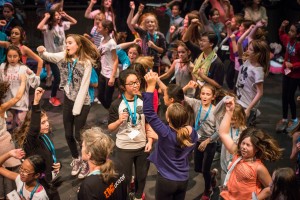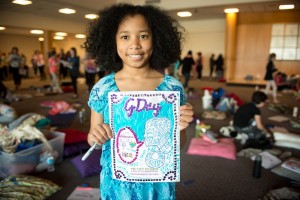Social entrepreneur Madeleine Shaw is known for her longstanding commitment to gender equality and progressive business practices. Co-founder (with her longtime business partner Suzanne Siemens) of Lunapads.com, a vertical, multiple-award-winning web retailer of natural personal care products, a founding Canadian Benefit Corporation (or BCorp). Lunapads’ signature products are responsible for diverting over 2 million disposable feminine hygiene products from landfills every month. The duo also founded Pads4Girls, a social change project that provides sustainable hygiene supplies to girls in developing nations to support their school attendance. Since its inception in 2000, Pads4Girls has touched the lives of over 300,000 girls in 17 countries, and today forms part of United Girls of the World, a registered non-profit society.
A member of the inaugural Vancouver class of the THNK School of Creative Leadership and a past presenter of the Social Venture Institute, in March 2015 Shaw received the Vancouver Board of Trade’s inaugural Wendy McDonald Award for Entrepreneurial Innovation. Her latest creation is G Day, a community-based rite of passage event series that welcomes 10-12-year-old girls into adolescence. Following the success of last year’s first two G Day events in Vancouver, G Day Toronto will take place on Sunday, April 26 at Daniels Spectrum in Regent Park.
In light of its Toronto launch, SEE Change spoke with Shaw about what inspired the creation of G Day, her definition of success and what the event will offer girls entering the very formative years of adolescence.
Why did you decide to launch G Day? What gaps were you trying to fill?
The inspiration for G Day goes back to my own experience as an adolescent. I was fascinated by the idea of becoming an adult woman, an idea that I conflated in my mind with starting my period. The idea was so compelling to me that it became a bit of a fantasy — that when the big day came, there would be some sort of initiation or celebration. The notion of transforming into an adult was very special, and even kind of magical to me, so I wanted to feel special; it was really that simple. Of course, my fantasy didn’t come true, and I was left with a deep sense of disappointment.
This all came back to me in 2012 when I was asked to speak on the topic of Women Transforming Cities, which inspired the idea of a place where families could bring their daughters to celebrate them as they approached adolescence. While we still celebrate other major rites of passage (graduations, weddings, funerals, etc), we’ve largely lost the notion of honouring the transition between childhood and our earliest steps on the road to adulthood.
Meanwhile, youth in general and girls in particular are more challenged than ever to maintain a positive sense of themselves as they move into this crucial time in life. I love the idea of gathering as families and communities to resurrect what has been a tradition throughout history and in cultures around the world.
There are loads of amazing educational programs directed towards girls empowerment and sexual health education. G Day is different from and complementary to these, offering instead a lived experience of ritual that is highly emotional in nature, providing powerful experiences of sisterhood, trust and being actively witnessed as a valuable member of the community.
Tell us about how your experience as a social entrepreneur inspired these events
I am a highly creative person by nature, which has naturally informed my path as a social entrepreneur. After 20 years in more-or-less the same job and field, it was time for me to try something new, and my experience to date of “colouring outside the lines,” as well as the support of my longtime business partner Suzanne Siemens, gave me the courage to follow my heart and give it a try.
Looking back, I am particularly pleased that I “went big” right out of the gate (the first G Day attracted 250 girls, a goal that I pretty much plucked out of thin air). I’m not sure whether I would have made the same choice earlier in my career.
Who can attend G Day and what can they expect?
We invite girls ages approximately 10 to 12 (2015 events will welcome those born in 2003, 2004 or 2005) and their “Champions”: parents, “aunties & uncles,” godparents, etc. Age 10 is typically when adolescence begins (adolescence and puberty are different: the former being about neurological and social development, while the latter pertains to reproductive and physical maturity). We want the girls who attend to feel bonded through their shared life experience. After age 13, there is a very different self-perception around being a “teenager.”
The day is structured, with some time in the beginning of the day for Girls and Champions together to learn a little bit about why we’re here and to set some intentions. From there, we run separate programs for both groups, until the last segment of the day when we bring them back together for some inter-generational sharing and (secular) ritual, then top it off with a dessert reception.
The girls’ programming includes interactive presentations around topics like self-esteem, creativity, the situation of adolescent girls in the developing world and leadership, as well as physical activities like dance and yoga. There are lots of opportunities for the girls to get to know one another as well as address the group as a whole about what’s happening for them.
Champions programming is slightly more practical, covering topics like preparing your daughter for menarche (first period) and tips for parenting adolescents. We also get the adults moving.
Why should young women attend G Day?
G Day is a unique opportunity to bond with other girls and experience Sisterhood. These girls are starting to receive powerful media messages about social comparison and competition that can result in poor self-image as well as unhealthy relationships. The more the girls see what they have in common by celebrating this unique time in life together, the less likely they are to, say, bully or compare themselves to other girls. The girls will have the benefit of being exposed to a wide variety of role models, and will hear the personal stories of women who have made interesting career and lifestyle choices. G Day is also simply a lot of fun!
What are your long-term goals for the event?
I would like to see G Day proliferate in cities and communities across North America and even globally, along the likes of event series like Pecha Kucha Night and Creative Mornings. Basically, I would like to see it go as far as it can: there is a massive opportunity here.
What’s your definition of success for the day?
I define success according to the impact that it has for the participants: if they felt inspired to love themselves and others more, to feel more compassion and a stronger sense of self; to feel more connected to themselves, their peers, their families and their communities while at the same time feeling safer to be more fully individuated. We often quote the African proverb that “It takes a Village to raise a child” — success for me is feeling like we have created a “Village,” if only for a day.
—————
Early bird tickets for G Day Toronto are on sale through March 31. For more information, see www.gdayforgirls.com/toronto.


